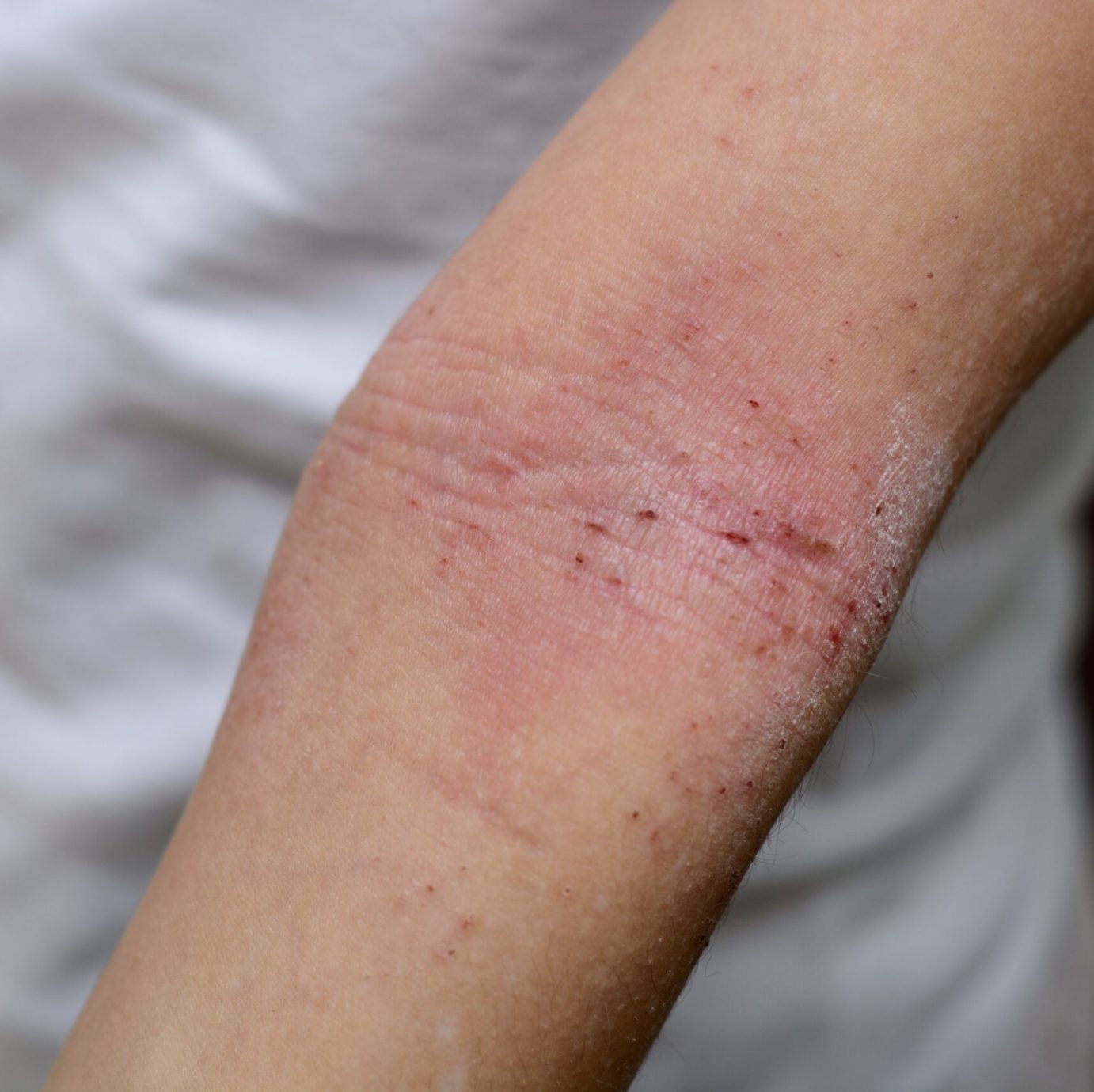Eczema in Children
We understand the impact Eczema can have on children both emotionally and socially. We are therefore particularly passionate about helping children to treat Eczema and maintain good skin health.

Eczema is a common skin condition in children
Eczema is a common skin condition in children and can cause red, dry and itchy rashes. It usually starts in infancy but persists through childhood. In infants, these rashes are typically found on the face and outer side of the limbs, however in children the rash may affect their neck and skin folds.
Heat, sweat and friction can worsen the rash, causing it to ooze, crust and bleed. The accompanying itchiness can be severe enough to irritate children during their sleep and cause a great deal of discomfort. Parents should take extra caution in keeping their children’s skin moisturized and clothing loose in order to reduce irritation. Early diagnosis and treatment can help children manage their eczema symptoms more effectively.

The causes of eczema in children can be due to the following:
- Genetic Factors: Children with a family history of eczema, asthma, or hay fever are more likely to develop eczema.
- Immune System Response: An overactive immune system can trigger inflammation in the skin.
- Environmental Triggers: These include allergens (like pollen, dust mites, and pet dander), irritants (such as soaps, detergents, and fabrics), and weather conditions (extreme heat or cold).
- Skin Barrier Dysfunction: A deficiency in the skin’s ability to retain moisture and protect against irritants can lead to eczema.
- Food Allergies: In some cases, certain foods can trigger eczema flare-ups, although this is more common in infants and young children.
Symptoms of Eczema in Children
The symptoms of eczema in children can vary from child to child, but some common signs could include:
- Dry, Sensitive Skin: The skin may feel rough and dry to the touch.
- Red, Inflamed Patches: These can appear anywhere on the body but are common on the face, neck, hands, and legs.
- Intense Itching: Itching can be severe, leading to scratching that worsens the condition.
- Swelling and Oozing: In some cases, the affected areas may swell and ooze clear fluid.
- Crusting and Thickening: Over time, repeated scratching can cause the skin to thicken and develop a leathery texture.
These symptoms can vary in severity and may come and go, often worsening during flare-ups.
What are the triggers for eczema in kids?
-
Soaps & washing detergents

-
Pollens

-
Dust mites

-
Pets/Animals (fur, hair and saliva)

If you have an allergy, your immune system can overreact to something it has identified as an invader or allergen. The immune system produces antibodies, which release chemicals and in turn cause an allergic reaction.
Furthermore, an impaired skin barrier can contribute to dryness and allow for easier penetration of external elements such as bacteria/viruses.
Eczema Causes



How to manage Eczema in Children?
Managing eczema in children involves several key strategies to soothe their sensitive skin and minimise flare-ups including:







Let's work together to help improve your child's skin condition
Let’s work together to help improve your child’s skin condition, as eczema can have a significant impact on their life. Unrelenting itch and scratching can disrupt sleep and lead to difficulty concentrating in the day. Severely affected children may refuse to socialise or participate in activities since peers may tease them for having “dirty skin”. That’s why it’s important to treat eczema and keep skin healthy.
Many people know of topical steroids as a way to reduce inflammation, but there are also many myths surrounding their use. Your dermatologist can explain how to safely and effectively use topical steroids with moisturisers for the best results. Non-steroidal medications are an option for children, and the doctor will be able to advise you about these. In cases of severe eczema that does not respond to treatment, oral medications may need to be prescribed. Together, we can improve your child’s skin condition and give them the best chance at a happy life.

Dedicated Specialists for Eczema
Dr Tan & Dr Ker are experienced dermatologists that have been treating patients suffering from atopic dermatitis (Eczema) for years

Personalised Treatment
There isn’t a one-size-fits-all treatment to Eczema. Understanding the condition through a detailed assessment and customising a treatment for every patient is key to keeping Eczema in control.

Adults & Paediatric
The treatment for eczema in adults and children can differ, so it is important to find the most effective approach for each individual. Our specialists are experienced in treating eczema in both adults and children.

Book
Consultation
WE ARE HERE
TO HELP YOU



GENERAL FAQ
The good news is that in many cases, eczema can improve as children get older. Up to 50-75% of children with atopic eczema may see an improvement or even remission of their condition during the teenage years. However, some adults may still experience flare-ups and irritation due to eczema – so it’s important to take proper care of your child’s skin and use appropriate medications to minimise any occurrences.
It is recommended to seek medical advice if you are worried about your child’s eczema symptoms. Your dermatologist can provide individualised treatment plans that may help improve your child’s condition.
The occurrence of food allergies is particularly high in young children aged 3 and under who have severe eczema. It can be suspected if the eczema is difficult to manage or if new rashes appear after consuming a certain type of food. The most common food allergens for kids include cow’s milk, hen’s egg, peanut, tree nuts, shellfish, wheat and soy. Testing for food allergies is a possibility; speak to your dermatologist regarding it.
Tests can help to determine the source of any potential allergic reactions and provide necessary information on how to manage them.
⦁ Environmental factors, such as heat, dust, pets and irritants (eg harsh soap)⦁ Dry skin
⦁ Being unwell (eg having a cold or flu)
⦁ Teething in babies
⦁ Skin infections with bacteria or viruses, which may be due to excessive scratching
⦁ Food allergens (rare)
⦁ Stress








